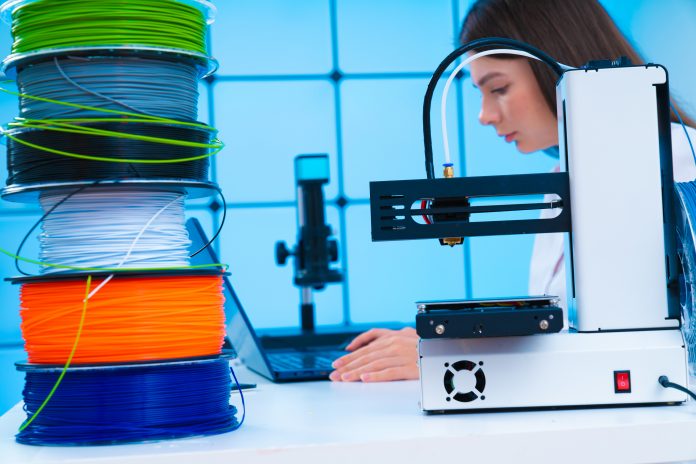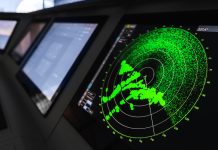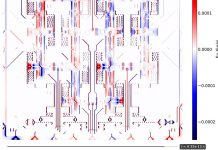The 2020 COVID-19 pandemic has proven to be an opportunity for 3D printing – EnvisionTEC identified several areas where their specific strengths in biocompatible materials could help to provide replenishment of stocks as well as new, alternative solutions
EnvisionTEC is a leading global provider of professional-grade 3D printing solutions, founded in 2002 by engineer entrepreneur Al Siblani. The original inventor of DLP 3D printing, EnvisionTEC has been a source of innovation for over 18 years, providing key solutions that have disrupted a number of industries.
In 1993 Siblani was working for an early 3D printing company and shortly thereafter he founded Sibco Inc., which provided 3D printing services and materials. Sibco’s European branch was registered in 1995. In 1996, after mastering the 3D printing technologies and materials at that time, Siblani decided to make his own 3D printing machines using a different approach to curing liquid resins into objects. His first patent submission was filed in 1999 and in 2002, he began commercialising DLP 3D printing technology in Germany and the United States under the new name of EnvisionTEC.
Delivering precision
EnvisionTEC’s first 3D printer was a hit in the jewellery market – largely because of its ability to deliver incredible precision and surface finish, quickly – and the technology spun out to other sectors from there. Customers who manufacture hearing aids, dental prosthetics and other small and smooth parts followed.
DLP 3D printing provides the ideal manufacturing technique for applications which require mass customisation, but EnvisionTEC’s industrious research and development team continued to work on improvements. In 2006 EnvisionTEC submitted a patent that would provide the basis for Continuous Digital Light Manufacturing (cDLM), a breakthrough upgrade to DLP that is much faster and allows for other performance improvements and the ability to work with new chemistries of resins, broadening the scope of industries that can now be served by 3D printing.
The 2020 COVID-19 pandemic has proven to be an opportunity for 3D printing to assist in finding new, innovative ways for healthcare professionals to provide assistance. Early in the pandemic, a shortage of the necessary diagnostic and treatment supplies was discovered. Many industries found ways to adjust their production to assist, and 3D printing proved that it was able to provide real answers for how to combat the supply chain crisis.
Combatting the supply chain crisis
Working hand-in-hand with healthcare leaders, EnvisionTEC quickly identified several areas where their specific strengths in biocompatible materials and fast, precise 3D printing equipment could help to provide replenishment of stocks as well as new, alternative solutions.
One specific shortage was of the specialised nasopharyngeal (NP) swabs used to collect samples from patients’ noses and throats for diagnosis. With a great need for widespread testing, NP swabs were a critical requirement in the healthcare community. A team from Beth Israel Deaconess Medical Center (BIDMC) at Harvard contacted EnvisionTEC and several other 3D printing companies in order to find a solution that could fill this need.
Working collaboratively with BIDMC, the 3D printing companies were able to quickly design hundreds of iterations of NP swabs, 3D print the prototypes, and send them on to BIDMC for evaluation. In just three weeks’ time, over 150 designs in 45 materials from 22 different companies working on the study were submitted to BIDMC. Four prototypes, including one from EnvisionTEC, were selected to undergo a clinical trial and passed.
Ramy Arnaout, MD, DPhil, Associate Director of the Clinical Microbiology Laboratories at BIDMC described the process: “In this study, we describe the first clinical-trial results of our effort to develop and evaluate multiple new swab prototypes on an extremely tight timeline to address a critical shortage brought about by the COVID-19 pandemic,” said Arnaout.
“Through the work of a large and selfless team from health care, academia, and the private sector, it took just 22 days from the time we identified the swab shortage to when our trial clinically validated the first new swab capable of high-throughput manufacture.”
The Envision One
The traditional manufacturing method for the swabs is tedious and limited, with the final testing swab needing to exhibit unique properties of softness and flexibility that are difficult to produce. EnvisionTEC’s final swab design is produced using their proprietary resin E-Guide Soft and printed on their Envision One cDLM 3D printer.
The Envision One, launched in early 2019, has been EnvisionTEC’s best-selling 3D printer to date, with over a thousand units currently in use among dental labs, orthodontic practices, universities, medical device manufacturers and more. Many of the owners of these units are accustomed to producing medical-grade products, making them the ideal production partners for this enterprise. The Envision One is capable of producing up to 2,400 swabs in 24 hours. This leads to a production capacity of EnvisionTEC and its Envision One user network of up to a million swabs per day.
EnvisionTEC engineers have designed a collection tip for a flexible nasal swab that has completed testing in an IRB-approved clinical trial for use in this unprecedented time. In order to be given this approval, a rigorous testing procedure was required to be passed. This testing of both the design and the material included several rigorous mechanical and chemical tests. This was done to ensure that the swabs pick up viral RNA particles and do not interfere with PCA/reagents, that they are chemically safe, that they would bend 180 degrees without breaking, and that the design would be able to safely collect enough virus particles from the nasal passage to effectively test.
One of the major advantages of the EnvisionTEC NP swab is that it continued to perform mechanically the same after being sterilised by steam at 270°F at 27 Pa in an autoclave. Other 3D printed swabs have shown deterioration following autoclave procedures. During the clinical trials performed by BIDMC, the EnvisionTEC swabs received positive comments from study staff for comfort, flexibility, and ease of insertion. According to Dr Arnaout, “Analytical results were positive, with a high level of concordance with the reference swab and with subjective results showing that [EnvisionTEC’s] swab performed neutrally or better than other test swabs”.
EnvisionTEC has long been committed to providing solutions to their customers and is now preparing to take on the call to action of helping to equip medical professionals with the tools needed to help combat this global pandemic. With a vast network of customers eager to help, EnvisionTEC has produced millions of sterilised and unsterilised NP swabs for hospitals, healthcare providers, government agencies, and armed forces to date.
Please note: This is a commercial profile











